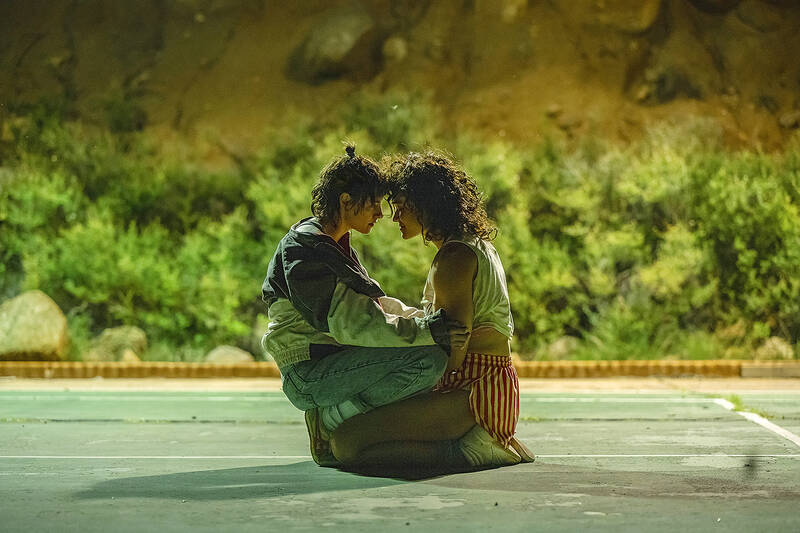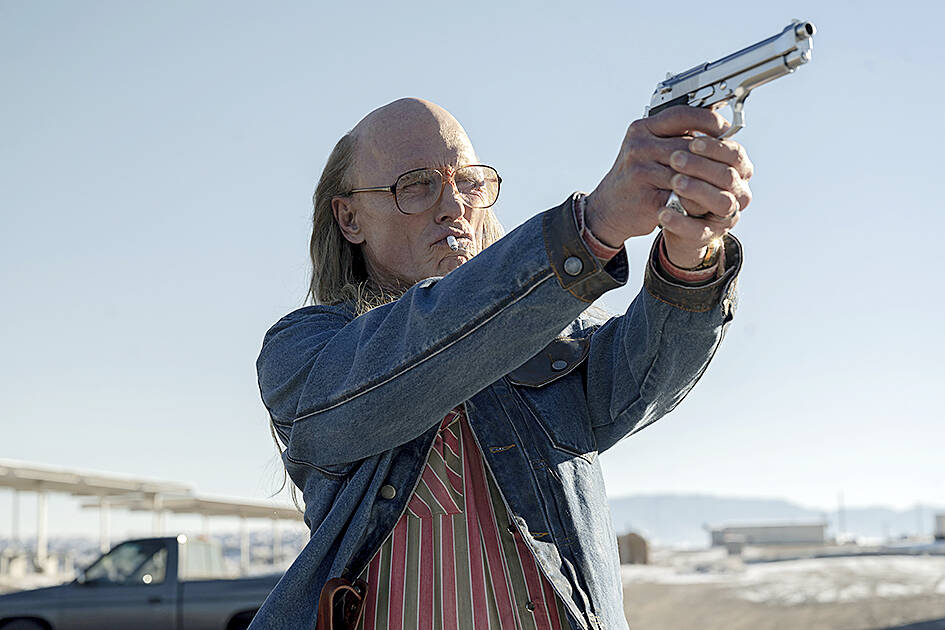Muscles ripple, veins pop and electronic music throbs in Love Lies Bleeding, a heaving, hyper-sexy neo-noir drenched in sweat, blood and bug guts.
If that last one seems a touch less expected, that moment, courtesy of a beetle-chomping Ed Harris, is far from the only off-the-wall provocation in Rose Glass’s film, a pulpy, fable-like lesbian crime thriller where bodies, large and small, get ravaged beneath starry desert skies.
Not all of it works. Heavy doses of melodrama and flashy surrealism sap some of the lurid spell of Love Lies Bleeding. But this feels tantalizingly close to the idealized version of a Kristen Stewart film. Stewart has been one of the most electric stars for years. But Love Lies Bleeding, in which she plays a cynical gym worker named Lou who falls in love with a body-building drifter, Jackie (Katy O’Brian), gives Stewart a vivid noir sandbox where all of her talent for obsession, desire and rage finds its gnarliest expression yet.

Photo: AP
Glass, the British filmmaker whose 2019 horror film Saint Maud marked an exciting debut, opens Love Lies Bleeding on a slightly magical note, gazing at the stars. The camera pans slowly down to a New Mexico warehouse where music thumps and people are flocking to. What sinister nocturnal den could this be? It’s momentarily disappointing to learn that it’s merely a gym, full of men and women pushing themselves to exhaustion with machines and dumbbells. Signs around them blare slogans like “Only Losers Quit.”
The urge to make yourself bigger — with weights, drugs, guns, power or, maybe, love — reverberates through Love Lies Bleeding. More than once, Glass will linger on muscles swelling, almost Hulk-like, though those expansions have nothing on the immensity Lou and Jackie ultimately find together.
Poisons are also lurking everywhere. To the exercisers, weakness is one. Lou is a smoker but trying to quit. Jackie is hooked on a body-builder fantasy and self-actualization mania. And then there’s the malignancy of the local shooting range, where Lou Sr (Harris) presides over a corrupt gun-dealing empire behind a desk surrounded by creepy crawlies. The satire of Love Lies Bleeding isn’t timid. A billboard reads: “Dreams, Next Exit.”

Photo: AP
The shooting range is where Jackie lands a job, after a transactional encounter with a sleazy, mulleted flunky named JJ (Dave Franco) in his car.
“That was magical,” he says after something that was very clearly not. The real magic will come later in Love Lies Bleeding, but not for JJ, whose abusiveness to his wife and Lou’s sister Beth (Jena Malone) leads to a bloody series of events that reluctantly bring Lou into increasingly closer orbit with the estranged father she resents, Lou Sr.
All of this proceeds, in a way, out of the love that blooms between Lou and Jackie. It begins with an injection of steroids and a kiss, and quickly turns passionate and protective. Their increasingly tight bond drives them to violent extremes. To be in love is to be ruthless — with former lovers (Anna Baryshnikov plays a jilted love interest of Lou’s) and family, alike.

Photo: AP
Jackie’s roid-addled disturbia is a factor, too, making Love Lies Bleeding an interesting corollary to the unreleased Jonathan Majors bodybuilder film Magazine Dreams, not to mention The Iron Claw, another beefy A24 film about family rot and muscle-building.
Like that film, Love Lies Bleeding is set in the 1980s, though it feels more out of time. As things spiral in the script by Glass and Weronika Tofilska, the movie keeps an expansive eye toward the grisly happenings, at times adopting the perspective of Jackie’s drugged delirium, like when she escapes to Las Vegas to participate in a body-building contest, or sliding closer to Lou Sr, as he coolly pulls strings.
But it’s getting dangerous to cut away from Stewart. Love Lies Bleeding loses a little momentum every time she’s not on screen. No one would come out of Love Lies Bleeding wishing for less of Harris, though. He seems to be getting only better with age, his voice more resonate. As clownish as he’s made up in the film — bald on top, long hair to his shoulders — he resolutely grounds a movie that resorts to some unnecessary outrageous flourishes. (I fear this is an increasingly common effect of today’s battered movie world — an urge to overcompensate with buzz-hopeful quirk.)
But neo-noirs made with this degree of style deserve some latitude to go for broke. As the sign says, “Only losers quit.”

That US assistance was a model for Taiwan’s spectacular development success was early recognized by policymakers and analysts. In a report to the US Congress for the fiscal year 1962, former President John F. Kennedy noted Taiwan’s “rapid economic growth,” was “producing a substantial net gain in living.” Kennedy had a stake in Taiwan’s achievements and the US’ official development assistance (ODA) in general: In September 1961, his entreaty to make the 1960s a “decade of development,” and an accompanying proposal for dedicated legislation to this end, had been formalized by congressional passage of the Foreign Assistance Act. Two

Despite the intense sunshine, we were hardly breaking a sweat as we cruised along the flat, dedicated bike lane, well protected from the heat by a canopy of trees. The electric assist on the bikes likely made a difference, too. Far removed from the bustle and noise of the Taichung traffic, we admired the serene rural scenery, making our way over rivers, alongside rice paddies and through pear orchards. Our route for the day covered two bike paths that connect in Fengyuan District (豐原) and are best done together. The Hou-Feng Bike Path (后豐鐵馬道) runs southward from Houli District (后里) while the

March 31 to April 6 On May 13, 1950, National Taiwan University Hospital otolaryngologist Su You-peng (蘇友鵬) was summoned to the director’s office. He thought someone had complained about him practicing the violin at night, but when he entered the room, he knew something was terribly wrong. He saw several burly men who appeared to be government secret agents, and three other resident doctors: internist Hsu Chiang (許強), dermatologist Hu Pao-chen (胡寶珍) and ophthalmologist Hu Hsin-lin (胡鑫麟). They were handcuffed, herded onto two jeeps and taken to the Secrecy Bureau (保密局) for questioning. Su was still in his doctor’s robes at

Mirror mirror on the wall, what’s the fairest Disney live-action remake of them all? Wait, mirror. Hold on a second. Maybe choosing from the likes of Alice in Wonderland (2010), Mulan (2020) and The Lion King (2019) isn’t such a good idea. Mirror, on second thought, what’s on Netflix? Even the most devoted fans would have to acknowledge that these have not been the most illustrious illustrations of Disney magic. At their best (Pete’s Dragon? Cinderella?) they breathe life into old classics that could use a little updating. At their worst, well, blue Will Smith. Given the rapacious rate of remakes in modern